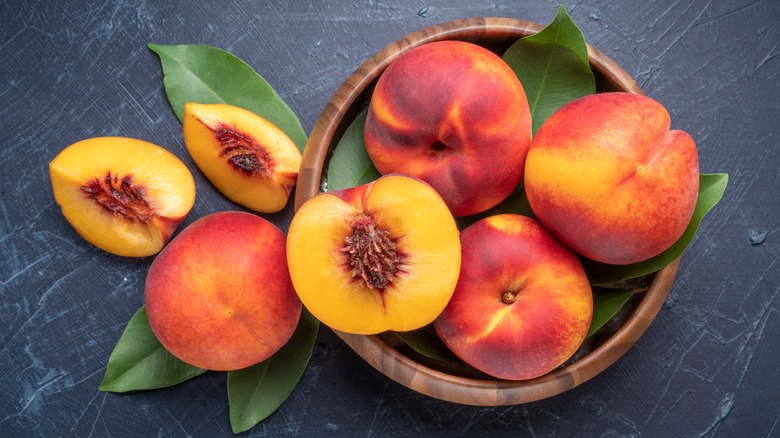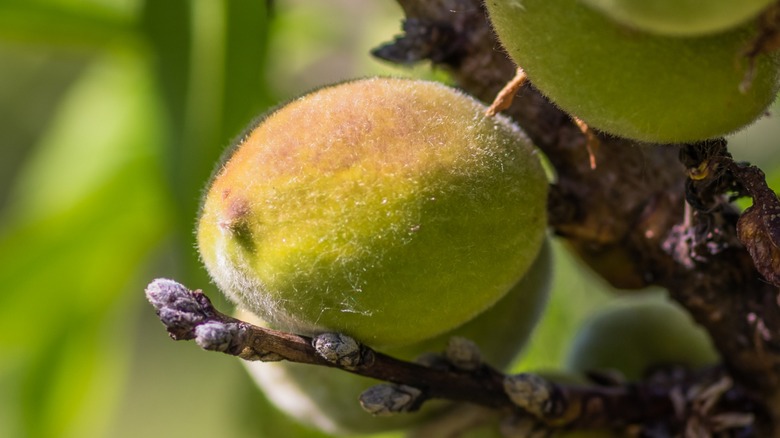White Wine Can Turn Unripe Peaches Into A Decadent Dessert
As summer fades away, so do the stone fruit offerings at supermarkets and farm stands, leaving peach lovers in the pits. While peaches are a grocery store staple year-round, the ones available in November aren't as soft, fragrant, or flavorful as the ones that you can find in July. In colder months, it's easy to succumb to temptation and buy a bag of lackluster fruits. But, while they may seem like a good idea in the grocery store, unripe peaches pose a quandary in the kitchen: What are you supposed to do with them?
You can always try the age-old trick of ripening peaches in a paper bag, but you probably won't end up with the same flavor you'd get from a sun-ripened fruit fresh off the tree. Instead, consider poaching them. In winter months, a warm, fresh-from-the-oven peach poached in wine and seasoned with spices is the perfect way to fill that peach-shaped hole in your heart.
Poached peaches make for a simple, elegant dessert, but, since the ingredients are so minimal, it's important to pick ones that can shine. Tasting Table's recipe for poached peaches in white wine calls for just peaches, white wine, sugar, and a pod of vanilla. After peaches, wine is the star of the show — so you should opt for one that you enjoy drinking. Paired with the perfect prosecco (or riesling, or pinot grigio), you'll be able to turn a bag of barely edible peaches into a light, sweet, and delectable dessert.
What is the best wine to use for poached peaches?
For advice on the best wine and peach pairings, Tasting Table turned to Catherine Fallis. The fifth woman ever to obtain the prestigious certification of Master Sommelier, Fallis now heads the wine subscription service at Bright Cellars. For poached peaches, she recommended opting for a wine that "you can sip with the dish as well."
This means that it should have a flavor profile comparable to that of the poached peaches and seasonings used. "In general it should be slightly sweet so you can add it to the dish and your glass," Fallis explained. She also stressed the importance of tailoring the wine selection to both the recipe and personal taste. "If vanilla bean is a strong component, a ripe, fruity, oaked, and slightly sweet white wine such as a California chardonnay would work well," she added.
For peach-based desserts in general, Fallis suggested a sweet, sparkling wine with notes of — guess what — peach. "I recommend our sparkling and lightly sweet Stigma Private Reserve Aromica from Columbia Valley, Washington, with notes of honey, peach, and pear," she said, noting that you should be able to use sparkling wine to poach peaches, so long as it is on the sweeter side. Even if your recipe suggests a drier wine, you might want to heed Fallis' advice. Opting for something sweet can help tone down the bitterness of unripe fruit.
Why should you poach unripe fruit?
Poaching counters the worst parts of eating an unripe peach: the tough flesh, the bitter taste, and the lack of sweetness or flavor. Meanwhile, the heat brings out sweet flavors and de-emphasizes bitter ones. It also softens the fruit, improving its texture and making it easier to digest. Poaching even lets you exercise a degree of control over the fruit's taste and texture: For a sweeter taste, add more sugar, for a softer texture, keep the peaches in the oven longer.
Many cooks even recommend using unripe fruit for poached desserts as the firm flesh helps the fruit keep its shape while it cooks. That's not to say that you can get away with poaching entirely unripe fruit, though. Ideally, peaches should be nearly ripe, but fully ripe peaches will work, too. Consider adjusting your recipe to fit the fruit. The longer you keep your peaches in the oven, the more they'll break down — but that's not the only factor. Ingredient ratios play a role, too.
The more sugar a recipe uses, the longer the fruit will take to break down, since the sugar candies the fruit and helps it hold its shape. It might take some trial and error to figure out what methods work for you. And, unfortunately, poaching won't save fruit that's past its peak. It's too easy for overripe fruit to break down, turning into a mushy, insipid mess. Instead, consider using your overripe peaches for jams, jellies, pies, and more.


